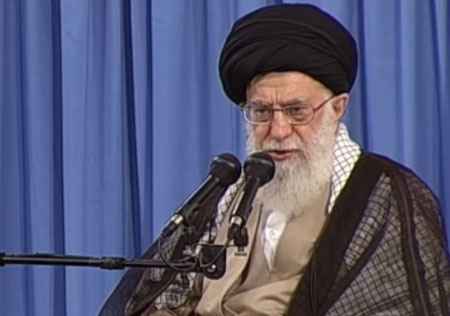by WorldTribune Staff, August 6, 2019
A group of Iranian women’s rights activists are calling on supreme leader Ayatollah Ali Khamenei to resign and for a “full transition” which would allow the adoption of a new constitution granting equal rights to women.
“During the 40 years of Islamic rule, we have been marginalized through force, repression, and inhuman and anti-women laws,” the 14 activists, which included lawyer Guiti Pourfazel, said in an Aug. 5 statement published online.

Criticism of Khamenei, who has the last say in all state matters in the Islamic Republic, is considered a red line, Radio Free Liberty/Radio Europe noted in a report on the statement by the activists.
Iranian women, some fiercely representing the Persian culture which the Islamist rulers have sought to erase, have played a key role in the growing popular revolt against the regime over the past decade.
Iran’s theocratic rule has led to “gender apartheid” and “erased” the rights of half of the country’s population, the women said.
Related: A tragic death punishes a regime that oppressed irrepressible Persian women, June 23, 2009
“Anyone who protested this gender discrimination has been subjected to insults, humiliation, beatings, imprisonment and, in some cases, to torture and execution,” the statement says.
The activists say they will push for their demands through nonviolent means.
The women voiced support for a similar statement issued in June women’s rights activists inside and outside Iran, including outspoken filmmaker Mohammad Nurizad and former Teheran university chancellor Mohammad Maleki, who had also called on Khamenei to step down.
“During these highly harmful and damaging years, lovers of Iran have repeatedly attempted in friendly civil ways to prevent the leaders of the Islamic republic, specifically Ayatollah Khamenei, from following their destructive deviation. Sadly, the regime has imprisoned patriots by shameful means, and either killed or forced them to endure a lot of suffering behind bars,” the June statement said.
Nurizad was reportedly detained in early July and transferred to Teheran’s Evin prison on unknown charges. Several other signatories to the June statement have said they have received threats.
Meanwhile, Great Britain announced it is joining the United States in an “international maritime security mission” to protect merchant vessels traveling through the Strait of Hormuz.
“The U.K. is determined to ensure her shipping is protected from unlawful threats,” UK Defense Minister Ben Wallace told reporters on Aug. 5.
“We look forward to working alongside the U.S. and others to find an international solution to the problems in the Strait of Hormuz,” Wallace said.
Royal Navy vessels will work alongside the U.S. Navy to escort ships through the busy strait, according to the Defense Ministry.
In recent weeks, Iran and Britain have each seized one of the others’ tankers. London has sent two warships to the Gulf to shadow British vessels in the area.
The U.S. Defense Department welcomed the British decision.
“This is an international challenge and we look forward to the opportunity to work together with the Royal Navy and with additional partners and allies who share the common goal of ensuring the free flow of commerce,” a Pentagon spokeswoman said in a statement.
New UK Prime Minister Boris Johnson has indicated that he may pull Britain out of the Iran nuclear deal, following U.S. President Donald Trump’s lead.
Germany, which continues to support the nuclear deal, has said it would not participate in a mission led by the United States and said on Aug. 5 it was pushing for a European Union observer mission to protect shipping in the Gulf.
But German Foreign Minister Heiko Maas said that it will “certainly take some time to convince the EU of this.”
In Teheran, Iranian Foreign Minister Mohammad Javad Zarif told a news conference that U.S. allies are too “ashamed” to join its forces in the Gulf, amid Washington’s campaign of maximum pressure on Iran that includes the re-imposition of crippling sanctions.
“Today the United States is alone in the world and cannot create a coalition. Countries that are its friends are too ashamed of being in a coalition with them,” Zarif said.
Intelligence Brief __________ Replace The Media
